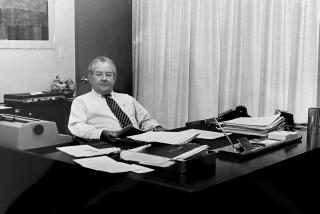Q & A
- Share via
Mimi Lozano Holtzman,
Hispanic genealogical
researcher, Westminster
Mimi Lozano Holtzman can trace her ancestry to King Ferdinand, the Spanish monarch who commissioned Christopher Columbus to explore the New World in the 1490s. When Holtzman, 63, began researching her roots a decade ago, she expected that the family tree would begin in Mexico. But the Westminster resident discovered that her heritage is not only Mexican but Italian, Indian, Basque and possibly Sephardic too. To help others discover their personal histories, Holtzman co-founded the Society of Hispanic Historical and Ancestral Research, a nonprofit genealogy organization. She is the group’s president and regional director of the State Genealogical Alliance, both volunteer positions. She spoke recently with Times correspondent Mimi Ko Cruz about her work.
Q: How does a person research a family history?
A: You work backward from yourself. You write down your name, your parents’ names, their parents’ names and dates of their births, marriages and deaths. You can get that information from family members, public records such as wills, marriage certificates and estates, and family history centers that keep files on millions of people and their descendants. . . . When you start, it seems like an impossible task, but you just have to jump in. There is help available.
Q: How has learning about your genealogy affected you?
A: By finding out how I fit in in this country and why my past was made up the way it was made up, I guess you’d say it grounded me. Even though I was born and raised here and graduated from UCLA, I used to feel that I wasn’t all-American because I spoke Spanish before I spoke English. But doing this research made me feel I am part of the history and foundation of this country and that the United States belongs to all of us. . . . Also, I’ve gained a tremendous respect for my family and what they went through in life, their struggles and triumphs. As I’m doing the research, I’m learning a lot about the times they lived in and how they coped.
Q: Your society helps anyone with some Spanish-language heritage trace his or her ancestors. Why?
A: The intent is to promote a positive image of the Hispanic presence in this country. I think people need that because we’re hearing that Hispanics are a burden on the community. That’s not the case. We contributed to this country’s founding, and that needs to be recognized in U.S. history. But the only way that history will be reflected is if we do our genealogies, which leads to finding out how we are connected to everyone. We need to get with it because it can lead to better understanding of ourselves and our culture and can bring the family together.
More to Read
Sign up for Essential California
The most important California stories and recommendations in your inbox every morning.
You may occasionally receive promotional content from the Los Angeles Times.












